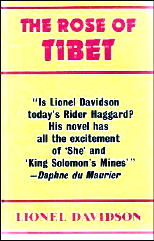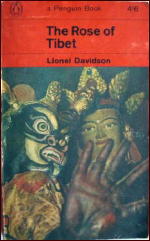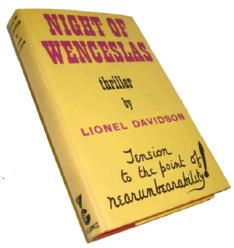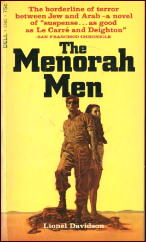Sat 29 Aug 2009
A Review by David L. Vineyard: LIONEL DAVIDSON – The Rose of Tibet.
Posted by Steve under Reviews[11] Comments
LIONEL DAVIDSON – The Rose of Tibet. Victor Gollancz, UK, hardcover, 1962; Penguin, UK, pb, 1964. Harper, US, hardcover, 1962. Reprint US paperback editions include: Avon, 1965; Perennial, 1982; St. Martin’s, 1996.

In a recent posting (The Spy Who Parodied, Part 3) I reviewed Agent 8 3/4 based on the novel Night of Wenceslas by Lionel Davidson.
Davidson, a British thriller writer, wrote only a handful of critically acclaimed novels, mostly in the spy story tradition. Among them were some of the best spy/adventure novels of the 20th century, and among those the outstanding work is The Rose of Tibet.
Davidson himself is a character in The Rose of Tibet, appearing in the framing sequence as he tries to put together the story of Charles Houston (pronounced ?Uston), a British journalist who traveled to remote Tibet at the time of the Chinese incursion there in the years after WW II. It is Houston’s story Davidson tells, and quite a story it proves to be.
It is difficult to discuss this book without mentioning other writers, Try to imagine James Hilton’s Lost Horizon written with the canny political eye of Eric Ambler, or H. Rider Haggard as re-imagined by Ian Fleming, perhaps a Harold Lamb novel written by Graham Greene (incidentally I mention Fleming and Greene with good reasons, both were admirers of Davidson and highly praised this book, as did Daphne du Maurier who asked in print if he was not the new Rider Haggard), John LeCarre in collaboration with Charles Crichton and T. E. B. Clarke, who penned many of the classic Ealing comedies.

The Rose of Tibet is all of that. It is a grand adventure, by turns very funny, very sexy, erotic, exotic, angry, honest , and above all compelling. Charles Houston, the most unlikely of heroes, proves to be the only hope of a remote Tibetan nation, one of those lost civilizations that writers like Hilton, Haggard, Burroughs, and others used to dot all over the wild places of the planet.
Davidson gives us a highly believable one, but no less enticing or exotic for that. The early scenes in this savage and exotic Eden, a sort of sensual paradise, are among the best such scenes you will encounter in fiction. It is strange yet familiar, exotic, erotic, yet completely believable. It is a splendidly evocative world.
Houston arrives in this remote, gentle, strangely savage, and doomed place on the eve of the Chinese invasion of Tibet, and as the PRC presses forward, a reluctant Houston finds himself chosen for the most delicate and dangerous mission of his life — to smuggle out a small boy and a young woman from this small Shangri La. The boy, a living god and the hope of the small nation, and the girl the repository of all that is erotic and beautiful, the rose of Tibet.
Their journey, accompanied by a small mountain pony, across the roof of the world one step ahead of the PRC, is the bulk of the book’s narrative. Treachery, his unworldly companions, the narrow roads and deadly mountain paths, murderous and unpredictable weather, a deadly encounter with an Asian brown bear, and the ultimate fate of Houston’s mission make up the rest of the novel, which ends with a delightful twist I won’t even begin to suggest after one of the most harrowing journeys in literature.

Literate and yet capable of spinning a tale with the best, Davidson’s works are a treasure trove for readers willing to delve into them. Night of Wenceslas, The Menorah Men (aka The Long Way to Shiloh) about a Raiders of the Ark kind of quest for the True Menorah.
And then there’s The Sun Chemist, Making Good Again, The Chelsea Murders, Kolymsky Heights, Smith’s Gazelle (a young adult novel), Under Plum Lake, and three more young adult novels as by David Line are among some of the best and most delightful books of the era.
Not a very great output for a period from about 1962 to 1998, but each and every one of them is a gem of great beauty.
Davidson deserves to be read, and almost certainly once you have read him you will reread him.

Among these gems The Rose of Tibet stands out. It is a perfect book of its kind, and I don’t really think you are likely to forget it once you have read it. Unlike many thrillers, it is one you will return to and enjoy time after time.
The Rose of Tibet belongs on that very small shelf of favorites that are equal in your heart as in your head, a curious mix of epic adventure, international intrigue, wild romance, Ealing comedy, and satiric commentary.
It is all that and more — little wonder Ian Fleming, Daphne Du Maurier, and Graham Greene fell under its powerful spell. I can honestly say that over the years everyone I have introduced the book to has ended up adding it to their list of favorite books of all time. It is certainly one of mine.
And don’t worry, I couldn’t possibly oversell it. It really is that good.
August 29th, 2009 at 6:16 pm
I bought this when it came out in paperback. I think an Avon book. I loved it. I still have it, but it’s hard to get to. It might be time to read it again, though.
August 29th, 2009 at 6:44 pm
Thanks for reminding me of this one. I did forget about it, but that’s my fault. Will definitely track down a copy.
Davidson reminds me a bit of Stephen Becker.
August 29th, 2009 at 6:44 pm
Bill —
Avon did the first paperback edition, right enough, but I don’t have a copy in either hardcover or PB. Given both your and David’s reactions, I think I’d better get one soon.
Dozy —
For a short article about Stephen Becker by Gary Lovisi on the main M*F website, see https://mysteryfile.com/Becker/Becker.html.
— Steve
August 29th, 2009 at 7:06 pm
Thanks, Steve.
August 29th, 2009 at 7:48 pm
Both Davidson and Becker raise what they are doing above the level of mere thriller, and both wrote far too little. In setting tone and effect they are very close. Just wonderful writers and storytellers.
August 29th, 2009 at 8:29 pm
Add Bill Pronzini in 1001 MIDNIGHTS to the list of those praising THE ROSE OF TIBET. In the final paragraph he says, “This is superb entertainment, utterly mesmerizing from beginning to end. … High adventure as only the British can write it, and not to be missed.”
I may post the entire review here soon, but I thought the statement above was worth giving as an advance preview.
— Steve
August 29th, 2009 at 8:42 pm
It really is a kind of magical book. I’ve talked about six people into reading it over the years and everyone of them ended up telling me it was one of the best books they ever read. His Kolymsky Heights written almost forty years later, about a half-Inuit math genius who goes undercover on a Siberian mission in the former Soviet Union is almost as good. Davidson is really a remarkable writer.
August 30th, 2009 at 2:25 pm
Based on that rave review, I immediately went to Amazon and bought it. Look forward to reading it.
Lee
August 31st, 2009 at 2:01 pm
I once tried to read this in translation, but for some reason it didn’t click. Should probably find the original. And now that I mention it, I think I have it somewhere around here…
August 20th, 2013 at 1:55 am
Lionel Davidson was my father. This book along with Kolymsky Heights is certainly the most liked of his books although he didn’t like it himself, possibly because he got repeatedly ill writing it and was generally in a foul mood as a result.
August 20th, 2013 at 9:29 am
Philip
Thanks for stopping by and sharing this interesting comment about your father!
— Steve